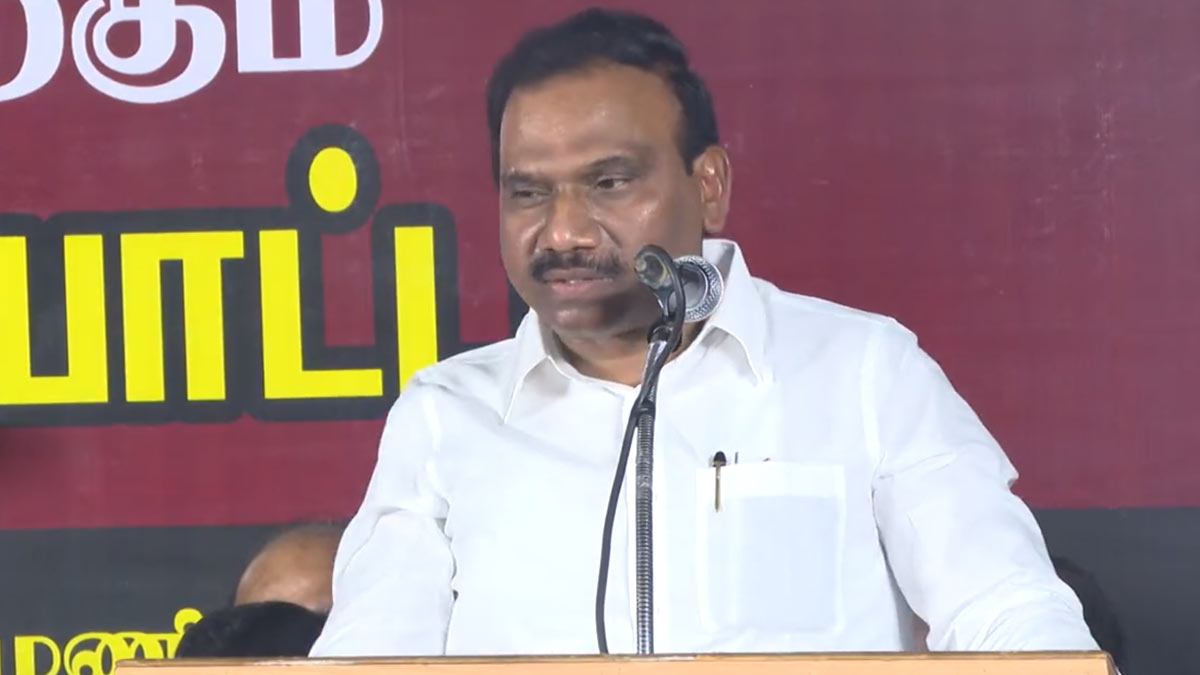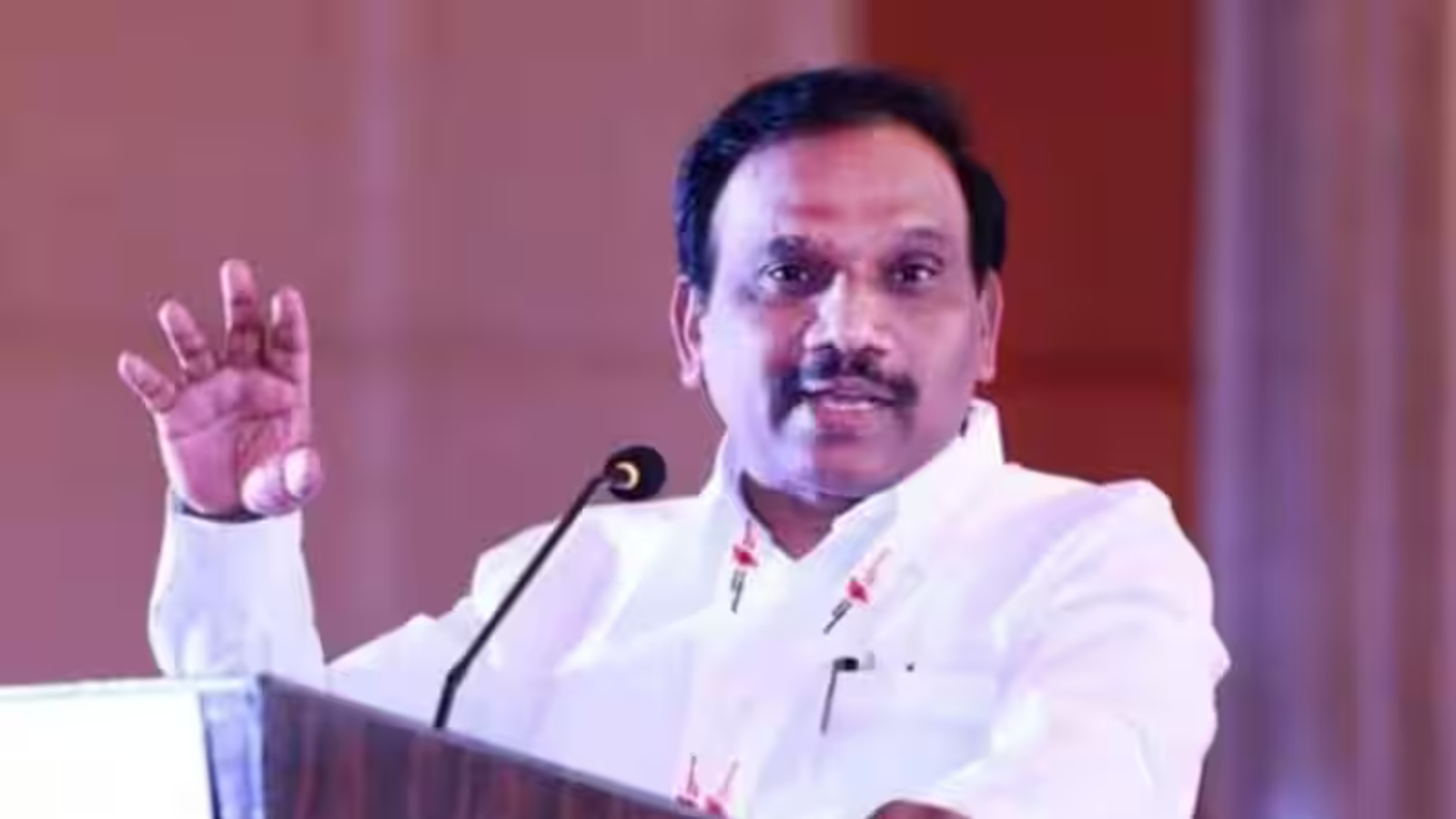DMK MP A Raja Sparks Outrage by Equating Sanatana Dharma to Diseases, Challenges for Debate

DMK MP A Raja Sparks Outrage by Equating Sanatana Dharma to Diseases, Challenges for Debate
In-Depth Analysis:
Amid the ongoing controversy surrounding the remarks made by Tamil Nadu minister Udhayanidhi Stalin about Sanatana Dharma, another prominent DMK (Dravida Munnetra Kazhagam) minister and Member of Parliament, A Raja, has ignited a fresh firestorm with his derogatory comments comparing Sanatana Dharma to HIV and social stigmas. These remarks have stirred outrage and debate across the nation.
Udhayanidhi Stalin’s Controversial Remarks
To fully understand the context, it’s essential to revisit the initial controversy. Udhayanidhi Stalin, who serves as the Minister for Information and Publicity in Tamil Nadu, stirred the hornet’s nest with his earlier remarks. He had compared Sanatana Dharma, often referred to as Hinduism, to diseases like malaria and dengue. This remark had sparked widespread condemnation from various quarters, with many demanding an apology.
A Raja’s Controversial Comparison
In an unexpected turn of events, A Raja, a senior leader of the DMK and a Member of Parliament representing the party in the Lok Sabha, took the controversy to a whole new level by equating Sanatana Dharma to HIV and social stigmas. This statement, made during a public address, has sent shockwaves across the country.
A Raja not only defended Udhayanidhi Stalin’s comparison but also escalated the situation by making an even more offensive analogy. He asserted that Sanatana Dharma should be likened to HIV, a statement that has deeply offended a significant section of the population who follow the faith.
Outrage and Criticism
A Raja’s comments have been met with widespread outrage, particularly from Hindu communities and leaders who see his words as insensitive and disrespectful to their beliefs. Many religious and political leaders have called for an immediate apology from the DMK MP, while others have demanded strong action against him for promoting religious intolerance and hatred.
Comparing Sanatana Dharma to HIV and Social Stigmas
To comprehend the gravity of A Raja’s remarks, it is crucial to delve into the implications of comparing Sanatana Dharma to HIV and social stigmas.
1. HIV Stigma: HIV/AIDS has been one of the most stigmatized health conditions globally. People living with HIV have often faced discrimination, isolation, and social exclusion. By comparing Sanatana Dharma to HIV, A Raja has not only disrespected the faith but also perpetuated a harmful stereotype, further marginalizing those living with HIV.
2. Social Stigmas: Social stigmas can encompass a wide range of biases and prejudices, often based on caste, religion, gender, or other factors. By equating Sanatana Dharma to social stigmas, A Raja appears to reinforce negative stereotypes associated with the religion, further alienating its followers and causing immense hurt.
The Call for a Debate
In a separate video statement, A Raja has expressed his willingness to engage in a debate on Sanatana Dharma if given the opportunity. This has sparked both interest and skepticism among various segments of society. While some see it as a chance to address the issue and seek clarification, others question the intent behind such a debate and whether it would genuinely serve to promote understanding and harmony.
Impact on Political Landscape
The controversy has also left its mark on the political landscape of Tamil Nadu and beyond. The DMK, a prominent regional party in Tamil Nadu, is currently in power in the state. These remarks have raised questions about the party’s commitment to maintaining religious harmony and respecting the diverse beliefs of its constituents.

The opposition parties, including the BJP (Bharatiya Janata Party), have seized on the opportunity to criticize the DMK and demand accountability from the party leadership. This incident has the potential to shape the political discourse in the region in the coming months.
The Way Forward
In the midst of this controversy, it is imperative to focus on constructive dialogue and understanding among communities with diverse beliefs. Derogatory comments and comparisons only serve to deepen divisions and perpetuate misunderstandings.
The onus is on political leaders and public figures to exercise restraint and promote harmony rather than contributing to religious tensions. Addressing this issue through open and respectful dialogue can be a step toward healing the rifts that have emerged in the aftermath of these comments.

Conclusion
The comparison made by DMK MP A Raja equating Sanatana Dharma to HIV and social stigmas has ignited a fierce debate and widespread condemnation. The comments have offended many and raised questions about the state of religious tolerance and respect in the political discourse of Tamil Nadu. As the nation watches, it remains to be seen how the DMK and its leaders, including A Raja, will navigate this controversy and whether they will take steps to promote understanding and unity among the diverse communities they represent.





